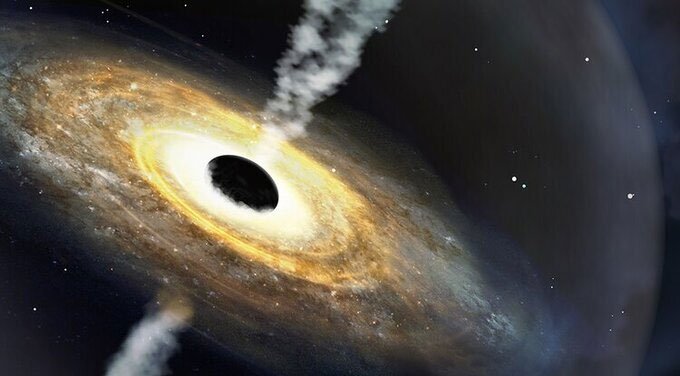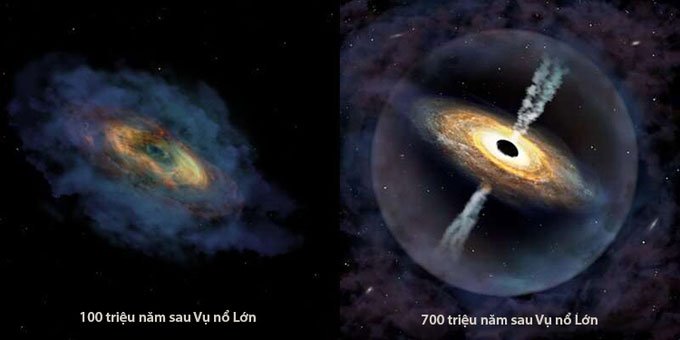Quasars containing black holes are 1.5 billion times more massive than the Sun.
Astronomers found the largest quasar ever in the early universe, more than 13 billion light-years from Earth.
Quasars are the most powerful celestial bodies in the universe. They are the core of distant galaxies, created when a supermassive black hole in the center "swallows" the surrounding matter and emits intense radiation. This star-like object is powered by infinite matter and can shine 1,000 times the entire star in the host galaxy.
Since the existence of quasars, astronomers have been keen to determine when they first appeared in the history of the universe. The newly discovered object , J1007 + 2115 , is one of the oldest quasars ever discovered, according to the Astrophysical Journal Letters.

Graphic standardized simulation J1007 + 2115. (Image: Phys).
J1007 + 2115 is also the furthest and most powerful quasar . It contains a supermassive black hole 1.5 billion times more massive than the Sun and takes 13.02 billion years of light to reach Earth. Astronomers estimate it formed after the Big Bang only 700 million years.
"It is the oldest monster we have ever known about quasars," said lead author Jinyi Yang, a postdoctoral fellow at the Steward Observatory of the University of Arizona, USA. "It only takes a very short time for the small black hole to grow to a huge size. This finding poses a great challenge for astronomers on the formation and development theory of black holes in the early universe. ".
The team suggests that J1007 + 2115 must start from a "seed" black hole 10,000 times the mass of the Sun as soon as 100 million years after the Big Bang. However, according to the current cosmic model, at the dawn of the universe, atoms were too far apart to interact and form stars, black holes or galaxies. The birth of celestial bodies can only begin in the Age of Regeneration, which occurred about 400 million years after the Big Bang.

J1007 + 2115 quasars (right) formed from seed black holes (left). (Photo: Phys).
J1007 + 2115 was discovered through a systematic search for the furthest quasars. The project was carried out by a team of 30 experts from Hawaii's Imiloa Astronomical Center, based on observations from the Maunakea Ground Telescope in Hawaii and the 4 m Víctor M. Blanco Telescope at the Observatory. American literature Cerro Tololo in Chile.
- The supermassive black hole is 20 billion times more massive than the Sun
- The biggest black hole collision is 9 billion light-years away
- Black holes can be 50 billion times more massive than the Sun.
- Why can black holes glow?
- Detecting black holes 'monsters' 350 million times more massive than the Sun.
- Korean scientists first discovered medium mass black holes
- Video: Compare the size of black holes in the universe
- Discover hundreds of black holes in the universe
- Millions of black holes are hiding in our galaxy
- Discover the largest celestial object cluster in the universe
- Decoding mistakenly thought that the black hole of the universe is
- A new discovery about the activity of a supermassive black hole in the early universe
 Van Allen's belt and evidence that the Apollo 11 mission to the Moon was myth
Van Allen's belt and evidence that the Apollo 11 mission to the Moon was myth The levels of civilization in the universe (Kardashev scale)
The levels of civilization in the universe (Kardashev scale) Today Mars, the sun and the Earth are aligned
Today Mars, the sun and the Earth are aligned The Amazon owner announced a secret plan to build a space base for thousands of people
The Amazon owner announced a secret plan to build a space base for thousands of people The nearest black hole discovered is only 150 light years from Earth
The nearest black hole discovered is only 150 light years from Earth  New discovery of the oldest black hole in the universe
New discovery of the oldest black hole in the universe  The Black Pyramid and the tragedy of deep oblivion: A thousand years later, still no escape from the tragedy of tomb raiding
The Black Pyramid and the tragedy of deep oblivion: A thousand years later, still no escape from the tragedy of tomb raiding  Exploring the 'Black Box of the Earth' project: A device that records the process of human extinction
Exploring the 'Black Box of the Earth' project: A device that records the process of human extinction  Finding the mysterious 'monster' that is making the universe expand
Finding the mysterious 'monster' that is making the universe expand  Why do images of black holes appear to be burning from the outside?
Why do images of black holes appear to be burning from the outside? 